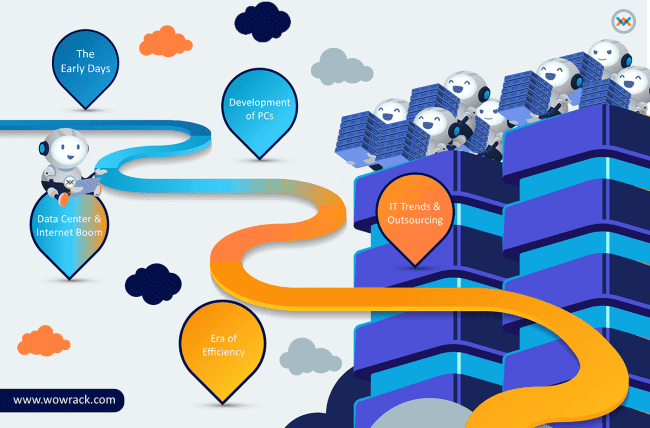One of the biggest questions facing small to medium-sized enterprises today is where to host their IT infrastructure. It isn’t uncommon for a small business to buy a 4-corner post rack and build their own mini-datacenter on-premises. As your business matures, you must consider the best practices of hosting your data center infrastructure. Is having a small rack for your servers sustainable for the foreseeable future? Does this setup meet or exceed your specific industry requirements? Stakeholders must consider these questions as they determine the best facilities in which to host their IT infrastructure.
The Advantages of Data Center Colocation
Inking a colocation agreement can provide your business with a plethora of benefits. The immediate benefits of data center colo include:
- 99.99% Network Availability
- Redundant Power Sources
- Facilities are Monitored by Security Staff
These three benefits alone can help justify the move to colocation services. Many organizations will struggle with meeting these requirements when building out a data center onsite, thus making an offsite data center an attractive option.
Business Advantages Gained by Data Center Colocation
The decision on where to host your IT infrastructure can transform your business. For example, if you host your infrastructure onsite, your organization must provide redundant network circuits, redundant power sources and a robust environmental control system to keep your server room cool and the humidity at an acceptable level.
When you think about the overhead your business must expend in efforts to achieve these tasks alone, making the move to an offsite data center can begin to sound like an easy decision. Some organizations face strict compliance standards that force them to implement advanced environmental monitoring. For example, many onsite data centers are required to have standing water sensors, door alarms, and fire suppression systems. Many businesses must also pay to have these systems serviced and certified on a regular basis. Some industries require that onsite datacenters meet a strict set of compliance guidelines such as HIPAA or PCI-DSS.
When organizations offload these tasks to a data center colocation provider, the main focus of the organization will shift back to providing value to the client, not building, maintaining and deploying data center infrastructure.
Data Center Colocation: A Turn-Key Solution?
Many organizations have adhered to the risk-averse methodology of storing data onsite rather than using a data center colocation provider. Unfortunately, building out a small onsite data center can be costly and labor intensive. Organizations face significant infrastructure costs when maintaining onsite data centers. This is why data center colocation continues to be a popular solution for businesses wanting to expand their IT infrastructure. Colocation is a turnkey solution because businesses can buy as much cabinet space, bandwidth and power resources that they need. Best of all, unlike a cloud solution, your business owns the hardware. This can be advantageous because if your organization ever needs to physically upgrade or replace the machine, your business can elect to pay a “Remote Hands” technician at the data center to perform the task. Alternatively, you can simply send your own technicians to the data center to recoup or service the equipment. Otherwise, you can always elect to have the equipment shipped to your office. The bottom line is that your business owns all the equipment that it puts in the data center.
Robust Network Connectivity
If you’ve ever performed a traceroute command to one of your favorite websites, you’ll likely see your packets travel through a network of telecom providers that are strategically located in large data center facilities all throughout the world. When you host your infrastructure within these facilities, your websites and your line of business applications will likely have a much shorter path to travel thus making your services more accessible and more reliable. Alternatively, data center colo providers often have dozens of telecom providers that run dark fiber into these facilities giving businesses the advantage of being able to rely on the data center’s network of redundant circuits. This is one of the ways colo providers are able to offer 99.99% network availability uptime guarantees.
Fun fact: The Ponemon Institute says that data center downtime costs the average company $9,000 per minute.
Transforming Businesses with Colo Services
Information technology should help you do business, not be the focus of your business. Ful rack colocation services are becoming a more popular solution for businesses because the agreement provides many of the guarantees a business would gain from onboarding additional IT talent for a fraction of the cost. This allows businesses to focus their resources on pursuing leads and making sales versus managing servers, switches and IT infrastructure. When you collocate your IT resources, you can begin to craft a more holistic approach to the way you deploy services to your end users.
For example, do you wish to implement a “Work from Home” or “Bring Your Own Device” policy? Hosting your IT infrastructure in a public facing data center could provide your end users with a much more reliable experience. Building out your infrastructure is a simple and predictable way to help deploy your infrastructure. If you only need half a cabinet, you can simply ink an agreement for 20Us of rack space. If you need more, you can simply request a new contract and connect your colo deployments using a route-based VPN with your firewall or network security devices.
How do you know if colo services are right for your business? Just crunch the numbers to see if they make sense for what your business is trying to accomplish. Colocation services can be utilized in a number of different manners including production infrastructure hosting, web application hosting or disaster recovery deployments. When you buy a contract for a colocated data center, you essentially have a blank canvas. The big advantage is that businesses no longer need to make the capital investment in building out their own data centers since the science of operating data centers has been largely solved by data center colo providers.
Can data center colo provide a win for your business? Find out more on our Data Center Colocation page.







